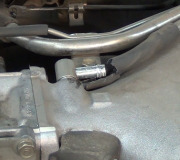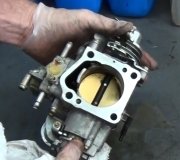I have tested the power booster (there IS vacuum pulling pedal away from foot when starting engine). I have come to the conclusion that atmospheric pressure is the problem since I DONT have hard pedal I assume there is no leak in power booster itself. So I am trying to understand the atmospheric filter, valve assembly and boot and I am not having any luck. Also, I can see the vacuum port seat moving back and forth with depression and I don't see any kind of atmospheric filter between the seat and the valve operating rod.
Should I be able to see the filter? Could it have rotted and fallen away? Can the valve plunger be malfunctioning and not opening and closing atmospheric port correctly? Can the poppet valve be cracked or broken and cause this problem? I havn't removed anything yet but if the leak (loss of atmospheric pressure) is being caused from one of these valve assembly parts can it be replaced or is it all internal to the power booster itself?
SPONSORED LINKS
Wednesday, July 21st, 2010 AT 1:39 AM




